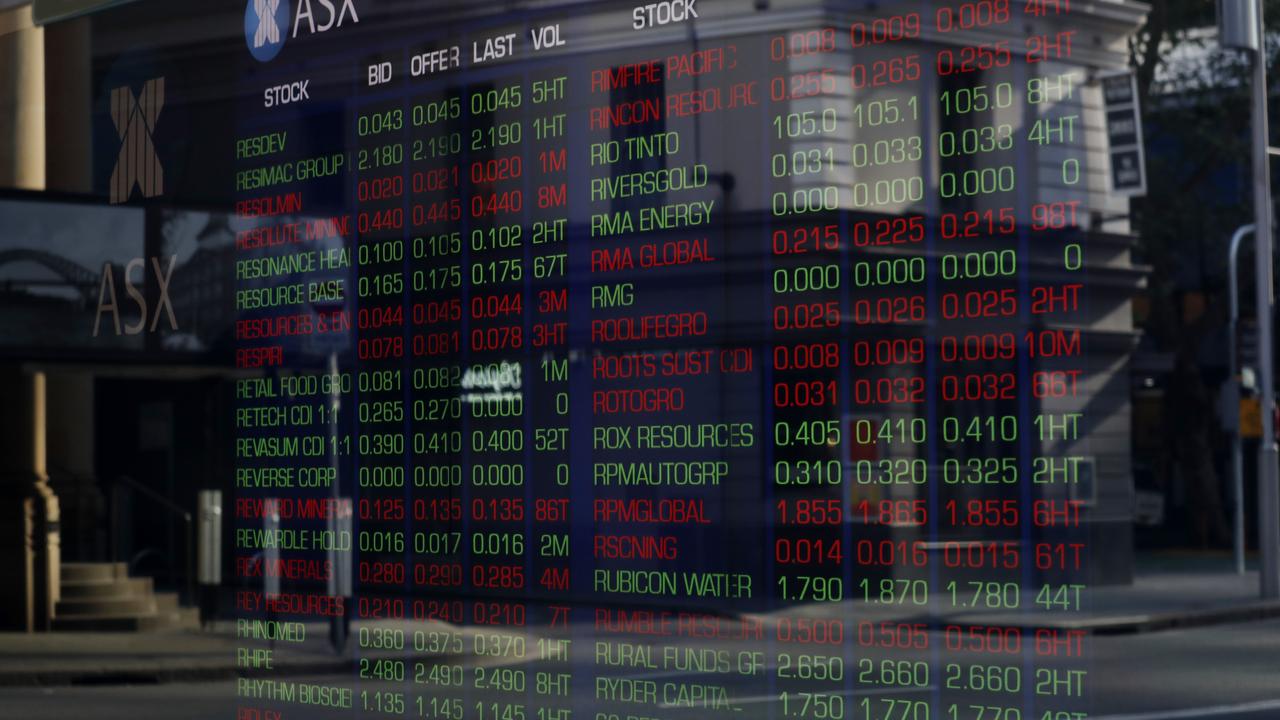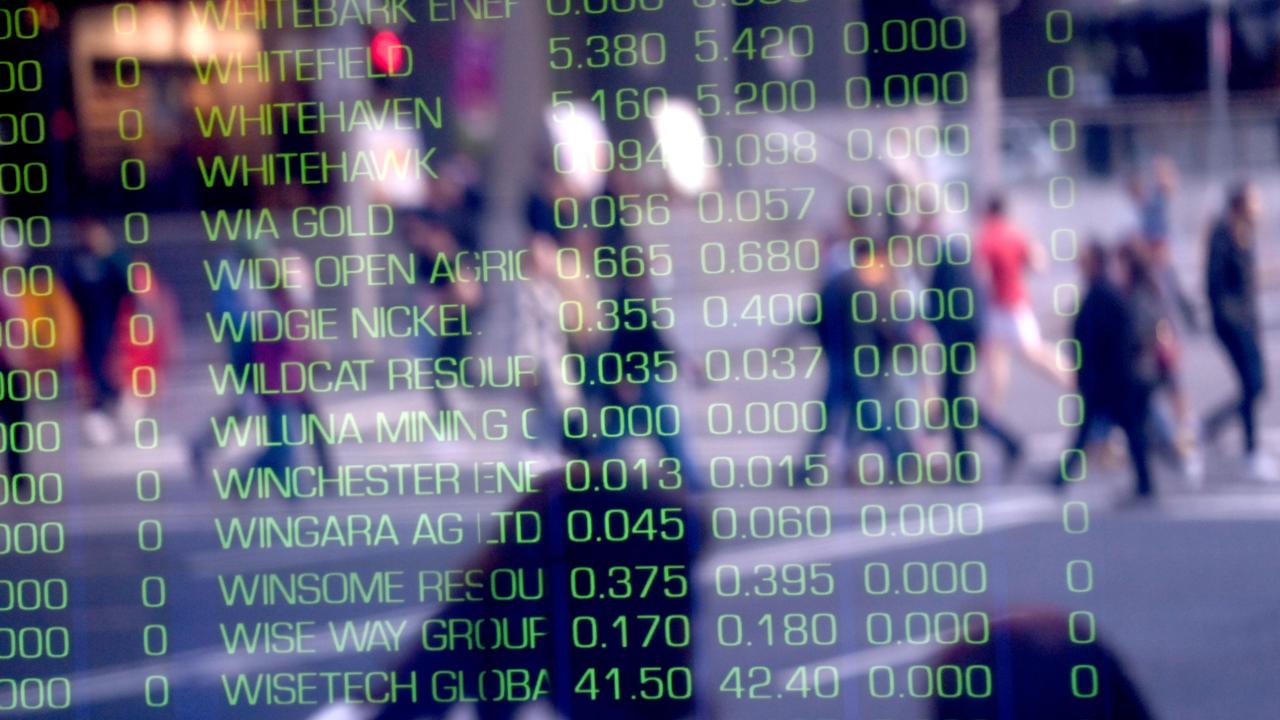Banks wipe ASX losses on fear of dividend cuts
A bank battering in the final throws of trade erased ASX gains as much as 2pc, with Westpac worst hit.
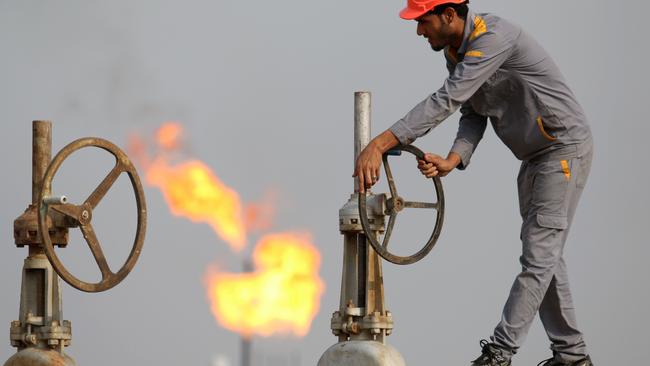
- Which bank took the biggest hit?
- Bank payouts to halve: JPM
- Treasury mulls Penfolds demerger
- BOQ defers dividend decision
That’s it for the Trading Day blog for Wednesday, April 8. The ASX slipped under the pull of the major banks after APRA urged banks to suspend dividends until the COVID-19 threat eases – Bank of Queensland deferred its decision at its interim results, while Macquarie ‘noted’ the warning.
Overnight, a strong Wall Street rally faded in late trade, as the price of oil plunged again. The Dow ended 0.1pc lower, the S&P 500 lost 0.2pc and the Nasdaq shed 0.3pc.
Perry Williams 4.59pm: Boral facing severe demand drop: Moody’s
Building materials supplier Boral faces three months of severely reduced demand for its products due to coronavirus, with significant cuts to house growth in Australia and the US and commercial construction likely delayed or cancelled, ratings agency Moody’s said.
The outlook for all of Boral’s credit ratings were lowered to negative from stable by Moody’s although its overall Baa2 ratings were affirmed. S&P lowered its outlook on Boral on March 30 to negative from stable and affirmed its BBB long-term rating on the company, warning it faced a significant earnings cut and cash flow pressures.
Construction materials is among industries worst hit by COVID-19 given its sensitivities to consumer demand and sentiment, Moody’s said, with Boral vulnerable to the virus outbreak continuing to spread.
“The change in outlook to negative reflects Moody’s expectation for weak earnings given a significant pull back in housing starts in both the US and Australia. In addition, Moody’s expects certain non-residential construction projects to be delayed or cancelled as a result of broad weakness in economic demand,” Moody’s said.
“Moody’s assumes a gradual recovery from the third quarter. However, there are high risks of more challenging downside scenarios, and the severity and duration of the pandemic and social distancing rules remain uncertain.”
Still, its Baa2 rating was retained reflecting its geographic spread and strong market positions across cement, concrete, quarry products, plasterboard, asphalt and roofing products. Boral also has a good liquidity profile with a loan facility of $US750m maturing in July 2021 although $221m was drawn down in February to repay Swiss notes maturing.
Boral fell 1.72 per cent to $2.29 on Wednesday.
4.35pm: Which bank took the biggest hit?
Bank dividends were the key drag on the market after APRA urged the sector to “seriously consider” suspending dividends to shore up capital as the COVID-19 crisis plays out.
Westpac, National Australia Bank and ANZ were key concerns, as they rule off their year on March 31, while Commonwealth Bank already sent out dividends last week.
As such, Commonwealth fared best at the close, slipping by 3.3 per cent to $59.81 as Westpac lost 5.3 per cent to $15.25, ANZ took a 4.9 per cent hit to close at $15.52 while NAB slipped by 4.8 per cent to $15.35.
Macquarie noted the APRA warning and said it would make a decision when it released earnings in May. Shares in the bank bucked the sector weakness, adding 0.5 per cent to $92.89.
Bank of Queensland released its interim results and deferred its dividend, sending its shares lower by 2 per cent to $5.03.
Bendigo and Adelaide Bank finished down 2.9 per cent while QBE, who also noted the APRA notice, edged up 0.6 per cent to $8.90 for the day.
Here’s the biggest movers at the close:
Richard Ferguson 4.21pm: JobKeeper subsidy package passes
Scott Morrison’s $130bn JobKeeper wage subsidy package has passed through the House of Representatives.
The plan to hand out $1500 fortnightly payments to more than six million Australians is the biggest financial package ever passed by the Commonwealth Parliament.
Nearly 750,000 businesses and sole traders have already applied for the wage subsidies, which Scott Morrison hopes will avoid an economic depression.
“JobKeeper will keep Australians in jobs and it will keep the businesses that employ those Australians in business, both now and into the future,” he told the House earlier.
The bill will now go to the senate. The Greens will put up amendments, but Labor will not support them.
Follow the latest in our Coronavirus Crisis live blog
4.16pm: Late bank sell off wipes gains
Fear of dividend cuts rattled the major banks on Wednesday, ultimately pulling the benchmark ASX to a 0.9 per cent loss.
Shares slipped down as much as 2.5 per cent at the open and a steady afternoon climb put the ASX200 on track for a positive close – that wasn’t to be, the benchmark falling sharply at the final match to close down 45 points or 0.86 per cent at 5206.9.
Meanwhile, the All Ords gave up 43 points or 0.8 per cent to 5258.8.
3.21pm: Still downside risk for ASX: UBS
UBS analyst Pieter Stoltz predicts a further significant fall in Australian corporate earnings per share estimates and the sharemarket as his economists forecast a “severe recession” caused by coronavirus lockdowns.
However, he doesn’t think the local bourse will become quite as “cheap” relative to “trough” earnings per share as it did in past recessions, due to record-low interest rates including the RBA’s ‘unlimited’ QE and larger fiscal stimulus.
While the rolling 12-month forward consensus PE ratio is currently 14.7 times, Mr Stoltz says the consensus doesn’t appear to have fully accounted for COVID-19 due to uncertainty in the range of outcomes.
“So far the consensus only expects a 3 per cent contraction in market EPS next year relative to last, but given our economists’ view of a severe recession, further downward EPS revisions appear almost inevitable,” he says
He estimates that six-month “hibernation scenario”, market EPS could fall 35 per cent. Using that “trough EPS estimate and assuming capital raisings of 5 per cent of the market’s market capitalisation, he comes up with a current price-to-trough PE ratio of 22 times.
He likes APA Group and Aurizon given their take-or-pay contract structures, Woolworths for its strong near-term sales and a2 Milk because it’s set to maintain strong revenue growth.
In Health Care he favours CSL for its plasma therapies and flu vaccines and Resmed for ventilator sales.
3.13pm: UniSuper tips banks to slash payouts
Dividends are squarely in focus on fears all the major banks could slash their payouts to cope with the coronavirus crisis, but UniSuper chief investment officer John Pearce says investing on dividend outlook alone is “short sighted”.
In an investment update this afternoon, Mr Pearce notes that the major banks still paid dividends during the GFC, albeit at reduced levels – ANZ and NAB cut their dividends by 25pc while Westpac slash its by 18pc and Commonwealth by 14pc.
“Given previous behaviour, our base case assumption is that the banks will again opt to pay a dividend, albeit materially reduced,” he writes.
“They’ll also take a provision to cover an expected increase in bad debts, and we expect that they’ll top up their capital base when conditions are more favourable.”
He tips BHP and Rio Tinto to maintain payouts through the crisis as their balance sheets are “in great shape” while ASX, APA Group, Telstra and Woolworths could even increase dividends as they weather the storm of uncertainty.
The funds airport investments (Sydney, Brisbane and Adelaide) along with shopping centres (Scentre and GPT) and Transurban are all likely to decrease dividends, possibly to zero.
Michael Roddan 2.48pm: APRA chair defends dividend call
The chairman of the banking regulator Wayne Byres has defended a move to reign in billions in bank and insurance company dividends as prioritising the watchdog’s primary role of “protecting the safety of bank deposits” and to “protect the capital strength of banks”.
As a flood of retirees jam email inboxes at the Australian Prudential Regulation Authority after it intervened in a key source of household income for self-funded retirees, Mr Byres said the regulator “recognises the important role dividends play in the incomes of many Australians”.
“However, as Australia’s financial safety regulator, APRA is responsible for protecting the safety of bank deposits and ensuring insurers have the means to pay claims from policyholders,” Mr Byres told The Australian.
“By asking banks and insurers to consider delaying any decision on dividends for a few months in light of the current economic uncertainty, or consider alternatives such as dividend reinvestment plans, APRA has sought to protect the capital strength of banks and insurers while minimising the long-term impact on Australians who rely on dividends as a key income source,” he said.
“This approach is designed to underpin financial system stability, which ultimately benefits all Australians.”
Read more: Backflip puts dividends in doubt
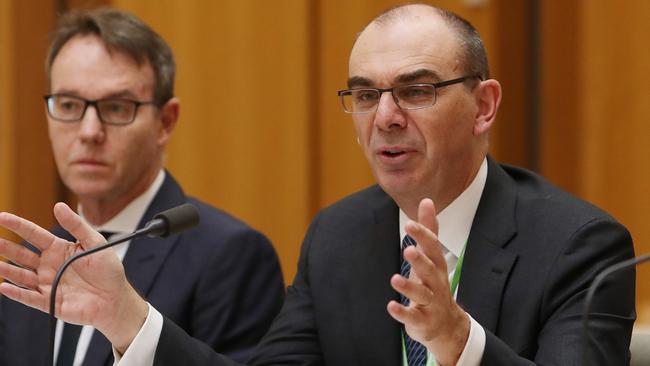
2.47pm: Shares stride higher
Australia’s sharemarket has turned up strongly after a broad intraday recovery.
The S&P/ASX 200 rose 0.6pc to 5281.2 in volatile trading after falling 2.5pc to 5121.9.
Most sectors are now positive and the Real Estate sector is particularly strong.
Banks have pared more than half of a sharp intraday fall that followed APRA’s call for dividend cuts.
CSL is up 2.3pc, Wesfarmers is up 3.3pc, Scentre is up 8.6pc, South32 is up 6.5pc, Stockland is up 9.2pc and Sydney Airport is up 4.4pc.
2.08pm: Aussie bank outlook sliced to negative
S&P Global Ratings has just downgraded its outlook for Australian banks.
The four majors have been cut from AA-/negative from AA-/stable.
This follows equivalent downgrades by Fitch Ratings yesterday.
Macquarie said this will put marginal upward pressure on wholesale funding costs for the banks.
Read more: S&P downgrades Australian outlook to negative
2.03pm: Cracks appearing in housing finance: ANZ
February’s dip in housing finance was the first since May 2019, around the time the housing market started its recovery, but serious risks to mortgage demand will restrain any recovery in the coming months, according to ANZ.
ANZ economist Adelaide Timbrell notes that government stimulus won’t be enough to eliminate COVID-19 effects on housing demand.
“There are serious risks to mortgage demand: the biggest one being reduced income and borrowing capacity for many households, but uncertainty amid COVID-19 economic hibernation (including on the eviction moratorium) and lack of consumer confidence are also in the mix,” she notes.
The bank predicts the unemployment rate to peak this year at 9.5pc, and remain elevated beyond 2021.
1.40pm: AAA warning won’t evolve to cut: Westpac
S&P’s downgrade on Australia’s credit rating outlook to ‘negative’ is unlikely to evolve into a full downgrade, and is not likely to prompt any major repricing in the bond market, according to Westpac.
In a note today, after S&P warned it could cut our prized AAA credit rating, Westpac’s Leila O’Connell and Damien McColough say the initial response of bond and the currency seem “hopeful”.
“We read it as a relatively hopeful, in that if the impact of COVID-19 evolves as they expect, then there will be no downgrade,” they write.
“S&P also highlighted other factors that would be supportive of maintaining a AAA rating, including “strong bipartisan support within parliament to achieve sound fiscal outcomes” and a belief that Australia is “more willing than its peers to raise revenue to achieve budget outcomes”.”
They point to similar action by the ratings agency in 2016, which prompted very little impact on the country’s access to the market and no discernible rise in 10-year bond yields
Read more: Australia warned on AAA rating
1.35pm: Bank payouts to halve: JPM
JP Morgan’s Andrew Triggs now expects Australian banks to cut their dividends by 50pc on average in the short-term to reflect “a more pessimistic view of impairment losses” based on revised economic forecasts in light of the coronavirus crisis and APRA’s guidance.
He has also downgraded his average EPS forecast by 16pc based on assumptions of housing loan losses of 13bps, a 200bps increase in consumer losses from FY19, 105bps loan loss for small and medium sized enterprises (worse than GFC) and 100bps in Institutional (better than the GFC) as unemployment hits 11-12pc this year, and has cut his EPS forecasts by a further 16pc on average.
Mr Triggs has kept an Overweight rating on NAB and Westpac, on the basis that much of this is priced in. He keeps CBA at Underweight given a “stretched” relative valuation despite solid capital and franchise position.
“While we expect APRA’s comments (and the downgrade from Fitch) to weigh on share prices tomorrow (Wednesday), the sector (ex CBA) is already trading at a price to book ratio of 0.8 times,” he notes.
The Australian banks sector is currently down 3.2pc after falling 3.7pc earlier today.
1.24pm: Home lending fell ahead of COVID-19 hit
The value of new home loans slipped by 1.7 per cent in February, a pullback after “considerable growth” since mid last year, according to the ABS.
In its latest figures, the national statistics body said there was no notable impact from COVID-19, as it predating the declaration of a global pandemic and restriction measures were not yet in place.
New home loans for owner occupiers fell by 1.7pc, while investor loans fell by 1.9pc.
The number of new loan commitments for owner occupier first home buyers rose 0.4pc in February following January’s rise of 0.5pc. The number of owner occupier first homebuyer loan commitments were up 19.4pc on February 2019 with increases for all but two months over the year.
1.02pm: REITs buck ASX slip
Local shares are trading down by 0.5 per cent at lunch, weighed down by financials after a warning on dividends from APRA.
The benchmark ASX200 was lower is lower by 37 points or 0.7 per cent to 5215, a bounce from daily lows of 5121.9.
Banks are doing the most damage – Westpac is lower by 4pc, Commonwealth Bank by 2.7pc, NAB by 3.7pc and ANZ by 2.9pc.
Elsewhere, REITs and consumer discretionary stocks are squarely in the green, with gains of 2.5pc and 1.3pc respectively.
Here’s the biggest movers at 1pm:
Nick Evans 12.49pm: Dacian launches deeply discounted raise
Struggling WA gold miner Dacian Gold has capped a disastrous year by launching a steeply discounted capital raising despite near-record gold prices.
After a series of production and mine-life downgrades the former market darling launched a 30c a share capital raising on Wednesday – a 78.5 per cent discount from its last trading price of $1.40 – seeking up to $98m to steer its way to profitability.
Dacian put itself on the block in June 2019 after a series of production downgrades but has failed to find a buyer. It suspended trading in its shares in early February citing the need to again review its mining plans.
When the company began construction of its Mt Morgan gold mining hub it flagged ambitions to produce 200,000 ounces of gold a year over a 10 year mine life.
That is now down to 110,000 ounces a year over a three year mine life, with the hope of adding to its resource inventory through regional exploration.
In a statement the company said it had launched 30c a share raising, underpinned by an $80m underwriting agreement with Macquarie Capital and Canaccord Genuity, with directors committing to kick in $5.7m through sub-underwriting agreements.
It plans to use $50m to pay down debt, $15m for regional exploration, $15m for pre-stripping work on its next open pit and $18m for “general corporate purposes”.
Dacian’s half year financial statements show it plunged to a $78.5m loss for the first half of the financial year after producing 75,237 ounces of gold at an all-in sustaining cost (“AISC”) of $1,562 per ounce.
The gold price was trading at $2688 an ounce on Wednesday.
Gerard Cockburn 12.10pm: Zip posts quarterly revenue lift
Buy now, pay later platform Zip says its revenue has picked up during the third quarter of the 2020 financial year, saying consumers are still choosing to shop online during the coronavirus pandemic.
The company reported third quarter revenue of $42.2m, a 17 per cent jump on the previous quarter, but an 8 per cent decline in transaction volume over the same period to $518.7m.
Zip said its merchant agreements across multiple industries, not just fashion and retail, would help the company trade through the current uncertainty.
“There has been an increasing shift in shopping behaviour to online as well as strong demand for everyday categories, bills, home improvements and office supplies, electronics and gaming, whitegoods and furniture,” the company said.
“This has offset a reduction in sales across fashion and apparel, travel and leisure, personal care and hospitality.”
Still, the company reduced its headcount by 78 or 20 per cent last week and reduced its capital expenditure plans, including delaying its UK launch date.
Within its local business, it has also adjusted its application underwriting algorithms and is “leveraging real-time portfolio management tools to actively monitor account behaviour and adjust limits accordingly”.
For the third quarter, the group had net bad debts of 1.84pc, compared with 1.68pc at the end of Q2.
11.59am: SCA completes placement for $250m
SCA Property Group has successfully completed its $250m placement to strengthen its balance sheet amid coronavirus closures.
The shopping centre landlord said the final placement had been priced at $2.16 per unit, representing an 8.5pc discount to its closing price on Monday.
A unit purchase plan is also open to eligible investors at the same price, expected to raise $50m.
Today, shares resumed trade down 6.8pc at $2.20.
Read more: SCA may capitalise on coronavirus crisis
11.42am: Trump talks up early reopening
US President Donald Trump has again talked up the prospect of an early reopening of the US economy.
Speaking on a Fox News interview, the US President said he’s starting to look at reopening the economy “very thoroughly”.
“We’ll be open again much sooner rather than later”, said Trump, adding that he would love to open the whole country at once but “some areas have been harder hit”.
These comments may help risk assets but the President has been too optimistic about the COVID-19 pandemic recently.
S&P 500 futures are little changed, while Australia’s S&P/ASX 200 is down 0.5pc at 5226 after falling 2.5pc to 5121.3 in early trading.
Thanks to the American people, we continue to see glimmers of hope. pic.twitter.com/7uyCHAZpEh
— The White House (@WhiteHouse) April 7, 2020
Bridget Carter 11.40am: Oil Search demand exceeds $1.1bn offer
DataRoom | Oil Search advisers say that the demand for its $1.1bn-plus equity raising was significantly in excess of the offer size.
In a final book message sent to investors, the advisers said that long term shareholders had been prioritised in allocations for shortfall stock.
“The book for the Oil Search accelerated institutional entitlement offer and placement has closed with bids significantly in excess of the offer size.”
The retail component of the entitlement offer has also been underwritten.
The oil and gas producer will resumed trade on Wednesday, with shares last down 8.8pc to $2.49.
Read more: Oil Search launches $1.16bn raising as it faces long oil price rout
11.21am: Cochlear gets FDA tick for remote tests
Cochlear says its received expedited FDA approval for its remote hearing check solution, allowing patients to be assessed for implants online as coronavirus restrictions limit access to clinicians.
In a notice this morning, Cochlear said its Remote Check solution was the first telehealth patient assessment tool for recipients, giving them a series of hearing checks to complete from home.
“Remote care has been a core pillar of Cochlear’s long-term innovation strategy, with access to care crucial to people who rely on a cochlear implant,” chief Dig Howitt said, just a day after he announced he was taking a temporary 30pc pay cut.
“With many people around the world now practising social distancing, Remote Check provides recipients with the ability to continue to access a level of care at a time when many clinics are closed to in-person visits.”
COH last up 0.2pc at $183.46.
11.09am: Penfolds spin-off sparks Treasury jump
Treasury Wines is one of the best performers in Wednesday’s session, bucking the benchmark’s 1.2 per cent slip after announcing plans for a potential Penfolds spin-off.
The winemaker said the move builds on its “premiumisation” strategy, to accelerate the separate focus of its “luxury versus commercial portfolios”.
TWE shares are higher by 7.3 per cent to $11.33 – after touching highs of $11.63.
Read more: Plan for Penfolds to go it alone
11.05am: Base case for payout suspension: Morgans
Morgans’ banking analyst Azib Kahn says the banks with interim results due in coming weeks, (ANZ, National Australia Bank and Westpac) “will suspend the next dividend”.
The comments follow APRA on Tuesday night releasing a letter to banks and insurers advising them to “seriously consider deferring decisions on the appropriate level of dividends until the outlook is clearer”.
“While APRA’s restrictions apply for “at least the next couple of months”, our base case for CBA (which is due to declare its next dividend in August) now also is that the next dividend will be suspended,” Morgans’s Mr Kahn says.
“While dividend suspension is now our base case for each bank’s next dividend, it is possible some banks may declare an ordinary dividend with a significantly reduced dividend payout ratio.
“Also, while bank boards which decide to not declare the next dividend may describe the decision to be a deferral until the outlook is clearer, we are not building deferred dividends into our forecasts at this point in time given the highly uncertain outlook,” he adds.
Bridget Carter 11.02am: People Infrastructure raising $17.5m
DataRoom | People Infrastructure has called on the services of Ord Minnett and Morgans to raise $17.5m.
The raise for the $95m listed recruitment firm is by way of a Share Purchase Plan and Placement.
The money will be used to support future acquisition opportunities that will emerge as a result of the current volatile economic conditions from COVID-19 and provide balance sheet support.
People Infrastructure is searching for $12m by way of a placement, with shares sold at $1.10 each.
Its Share Purchase Plan will raise about $5.5m.
The offer is a 15.1 per cent discount to the last closing price of $1.295 on Tuesday.
11.00am: Macquarie headwinds priced in: MS
Morgan Stanley’s Andrei Stadnik has cut his target price on Macquarie Group by 20pc to $115 a share after a sharp deterioration in global conditions.
He now expects Macquarie to miss its guidance of “slightly down”, with a 14pc fall in FY20 and a further 18pc fall in FY21.
But while noting that the consensus is still looking for flat earnings, he says “the headwinds are priced in”.
Mr Stadnik has kept his Overweight rating, on the basis of Macquarie’s “strong capital, track record of resilient earnings, and opportunities to deploy dry powder in dislocated markets”.
MQG shares are about 40pc below a record high on March 20 whereas the S&P/ASX 200 is down 28pc.
MQG has not missed its earnings guidance since 2012. MQG shares fell 85pc in the GFC.
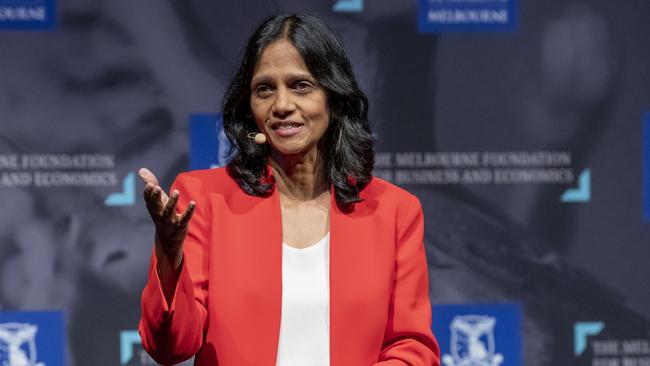
Lilly Vitorovich 10.49am: Seven suing Bauer over mag merger
Seven West Media’s Pacific Magazines is taking Bauer Media to court to force the German-owned family company to wrap-up the $40m acquisition of its magazine business, which consists of about 20 mastheads such as New Idea and That’s Life.
The case has been filed in the Supreme Court in Sydney and is listed to be heard on April 24 at 945am, according to the NSW Online Registry for courts and tribunals.
Pacific Magazines outgoing boss Gereaurd Roberts is understood to have emailed staff on Wednesday morning about the court case, telling them that the sale may go through as planned on Thursday. But if it doesn’t, they will be at Pacific for another 4-6 weeks.
Cash-strapped Seven said Wednesday morning that its shares have been “temporarily paused” on the ASX, pending a further announcement.
Read more: Bauer looks for ways to get out of Pacific Magazines deal
10.42am: Profits jump at Rio’s Singapore hub
Rio Tinto’s profit from its controversial Singapore marketing hub surged almost 75 per cent to $US459m in 2019, according to the company’s latest report on its global taxation payments, as the mining giant revealed the extent of its latest dispute with the Australian Taxation Office.
Rio said on Wednesday it had paid $US4.8bn in corporate taxes across the globe in 2019, or $US7.6bn, including mining royalties, on underlying before-tax earnings of $US21.2bn.
The overwhelming majority of that total was paid in Australia, with the company’s annual tax payment report saying it had paid $US4.2bn in corporate taxes to the ATO and $US6.2bn in total including royalties on its West Australian iron ore operations.
RIO last down 3.3 per cent to $87.69.
Read more: Rio Tinto ‘hub’ profits jump
Max Maddison 10.34am: APRA pauses new bank licenses
The issuance of new licenses for banking, insurance and superannuation companies has been suspended for at least six months due to the ongoing economic certainty surrounding COVID-19.
In a letter to applicants, the Australian Prudential Regulation Authority (APRA) said entry into the financial system was “challenging” even during normal economic conditions, let alone amid the “fundamental change” in the economic and social environment in both Australia and across the globe as a result of the outbreak.
Melisande Waterford, general manager of regulatory affairs and licensing, said financial institutions occupied a “unique position of trust”, and said a license may be granted in rare circumstances when it was necessary for APRA to carry out its mandate.
“The financial safety of these institutions is key to the financial stability and wellbeing of the community and, as a result, these institutions are subject to higher standards than many sectors of the economy. This includes higher entry standards. The process of granting an APRA licence is intended to help ensure that a new entrant will be able to honour the financial promises it makes under all reasonable circumstances,” Ms Waterford said.
APRA said current license applications would continue to be assessed to minimise the delay after the hold was lifted.
10.12am: APRA warning weighs on ASX
Financials are weighing on the market at the open, after APRA’s warning that banks should consider suspending their dividends.
The benchmark ASX200 is lower by 94 points or 1.78 per cent to 5158 – far larger than the 0.7pc that had been projected by overnight futures.
That’s as financials trade lower by 3.4 per cent – led by trade in the majors who are often relied upon for their dividends. Westpac is worst hit, down 4.7 per cent as the rest of the big four trade down between 3.1pc to 3.8pc.
But all sectors apart from Financials, Utilities and Industrials are currently outperforming the index.
Sovereign risk does not appear to be affecting the sharemarket after S&P cut the outlook on Australia’s AAA credit rating to Negative. The Australian dollar fell 0.4pc to 0.6142, but analysts have long thought even the loss of the AAA rating would not have a major impact.
That should be more so now that most countries are undertaking major deficit spending to shield their economies from recession amid coronavirus lockdowns
David Swan 10.06am: Altium touts resilience amid COVID-19
Electronic design software maker Altium (ASX: ALU) has withdrawn its FY20 earnings guidance, the latest company to do so in the wake of mounting uncertainty around COVID-19.
The Sydney-based company said that despite the circumstances, it was operationally and commercially well positioned, and electronic design would be resilient to the market conditions.
“As a hi-tech company, Altium’s global workforce is geared to work digitally and for the past two months we have greatly increased our focus on driving productivity in this new operating environment,” chief executive Aram Mirkazemi said.
“We are fortunate that our operating model is robust and highly adaptable to the new global conditions, as our marketing and direct selling are conducted through the internet and via telephone. Moreover, we are well diversified across industry segments and regions worldwide.”
He added the company was still targeting a ‘market leadership’ position of $US200m revenue for FY20.
“Altium is financially very strong with real earnings and profitability and a strong balance sheet. Altium’s cash reserves have continued to grow and are expected to remain strong,” CFO Joe Bedewi said.
ALU shares opened up 1.8pc to $31.
10.02am: S&P cuts Australian outlook to Negative
S&P Ratings has cut its outlook for Australia’s long-term sovereign credit rating to Negative from Stable, while maintaining the coveted AAA credit rating.
AUD/USD immediately dropped from 0.6175 to 0.6151.
Australian 10-year bond yields rose from 0.898pc to 0.9198pc.
BOOM. S&P changes outlook for Australia from stable to negative.
— David Ingles (@DavidInglesTV) April 7, 2020
Below is a history of ratings changes from S&P on the country. pic.twitter.com/MBNOGvqaAB
9.42am: Pioneer Credit takeover doubts rise
Pioneer Credit has requested a trading halt this morning, after a communication from suitor and senior lender The Carlyle Group.
“A trading halt is requested in order for the Company to consider this communication generally and the impact it may have on the Scheme of Arrangement,” the company said this morning in a filing to the ASX.
The two were in the throws of a takeover deal, and while Carlyle has already injected debt into the business, it is yet to complete the scheme of arrangement.
Just last month, Carlyle asked for more data on Pioneer’s operations and performance, prompting some to speculate on the future of the deal.
Shares are expected to be halted until April 14.
Read more: Carlyle Group may back out of agreed Pioneer takeover
9.35am: Banks add to downside risk
Australia’s sharemarket may have downside risk today beyond a 0.7pc fall indicated by overnight futures relative to fair value.
APRA’s guidance that banks should “seriously consider” suspending their dividends is likely to hit bank shares, although this is partly expected.
So far today, Bank of Queensland has suspended its interim dividend, NAB says it will take “take APRA’s guidance into account” and Macquarie has said it will “work through the details” of APRA’s guidance.
There’s also a growing realisation that industry super funds holding large amounts of illiquid assets are selling shares to meet redemptions under the government’s Early Release Scheme.
Plus, the companies that recapitalise via equity raisings tend to do extremely very well over the next year, so institutional investors are selling large cap stocks to be ready for the raisings.
Also, on the negative front, the mass withdrawal of corporate earnings guidance continues, with Seven Group, Altium and McMillan Shakespeare doing so today.
But S&P 500 futures are up about 0.4pc in early trading and while the S&P 500 fell 0.2pc and closed near its low after rising 3.5pc last night, it did hold most of the prior day’s 7pc jump.
Also, WTI crude oil futures are up more than 4pc this morning after falling 9pc overnight.
And the US Energy, Financials and Materials sectors rose while Tech was the main drag.
Perry Williams 9.16am: Ad, oil slump serves dual hit to Seven
Billionaire Kerry Stokes’ Seven Group Holdings has withdrawn earnings guidance for the 2020 financial year after its media arm was hit by falling advertising from COVID-19 and energy investments by plunging oil prices.
Seven West Media, 40 per cent owned by Seven Group, ditched its annual earnings guidance on March 24 blaming the escalating fallout from the coronavirus, including a “material fall” in advertising and cancellation of sports events.
It also faces a hit from the oil price rout via its 30 per cent stake in Beach Energy which has cut its annual earnings guidance by 8 per cent this year.
“Like most Australian businesses Seven Group will be impacted by the consequences of the significant escalation of the measures taken by governments to slow the rate of COVID-19 infection,” Seven Group chief executive Ryan Stokes said.
Seven had previously guided for high single digit growth for the 2020 financial year on the prior year.
Despite the economic slowdown, WesTrac year to date revenue is up 15 per cent on the prior period and 5 per cent on budget. Coates Hire’s revenue so far this year is up 3 per cent on the prior period but down 1 per cent on budget with events revenue curtailed.
Seven Group has $803m of undrawn facilities and cash with $430m committed and the next substantial refinancing due in 18 months. The company also retains a $300m “crisis liquidity buffer” to ensure the company has headroom to keep operating through any government mandated actions.
Seven Group confirmed it will pay an interim dividend of 21c a share on April 20.
Gerard Cockburn 9.09am: MMS to stand down majority of staff
Vehicle leasing group McMillian Shakespeare (MMS) is preparing to stand down the majority of its employees, following significant sales declines in new asset financing, novated leases and its risk businesses spurred by coronavirus restrictions.
“Effective from 13 April 2020, the Company will temporarily move into a partial or full stand down of the workforce in most parts of the business where there has been or is likely to be a material change in workload,” it said.
The expected decline follows a bleaker outlook for the car industry, which is already experiencing a plummet in sales of more than 60 per cent.
The company noted its board, managing director and all group executives will collectively reduce remuneration by approximately 35 per cent, while its UK asset management business furloughed non-essential workers and reduced salary to remaining staff.
On March 19, MMS withdrew its earnings guidance for the 2020 financial year.
9.06am: QBE stands by final dividend
Insurer QBE has confirmed payment of its final dividend, after “careful consideration” of APRA’s warning on capital levels.
In a notice this morning, the group said it would proceed with its 2019 dividend as scheduled following “due consideration”, with 27c per share to be paid on April 9.
9.01am: Macquarie predicts broad payout pause
Macquarie analyst Victor German predicts Australian banks will cut or suspend their upcoming dividends after an APRA warning that they should “seriously consider” suspending their dividends until COVID-19 fallout recedes.
He notes that under the “stressed scenario”, banks need to “largely eliminate dividends and potentially raise capital during the peak year of losses”.
Mr German warns that the potential full removal of the dividend is “likely to result in increased strain for retail shareholders” and a possibly diminished appetite for yield-focused funds and yield ETFs, is “prone to impact banks’ share prices further”.
He also notes that APRA is encouraging banks to “initiate prudent capital management actions, on a pre-emptive basis”, but with the likely reduced support from the core shareholder base – retail investors own about 50pc of bank shares – it will be arguably “more difficult”, so in their results starting late April, banks may opt for a reduced dividend, and a DRP underwrite to eliminate the capital drag.
Additionally, Fitch downgraded Australian banks to A+ from AA- yesterday, putting upward pressure on wholesale funding costs, particular if other agencies follow suit.
8.56am: What’s on the broker radar?
- BHP raised to Outperform – Credit Suisse
- Computershare raised to Positive – Evans and Partners
- Downer EDI raised to Outperform – Credit Suisse
- Evolution Mining raised to New Buy – Jefferies
- Flight Centre raised to Add – Morgans
- Hub24 reinstated Buy – Shaw and Partners
- Newcrest rated new Hold – Jefferies
- Oil Search raised to Overweight – JP Morgan
- Rio Tinto assumed Underperform – Credit Suisse
- Saracen Minerals rated new Buy – Jefferies
8.49am: Macquarie ‘notes’ APRA payout call
Macquarie says it will “work through” the Australian Prudential Regulation Authority’s call to banks to consider suspending or reducing dividend payouts.
APRA said banks should “seriously consider” suspending dividends until the fallout from COVID-19 recedes. APRA also said that if banks decided to declare dividends based on robust stress-testing results discussed with APRA, the payments should be at a “materially reduced level”.
“Macquarie will work through the details of APRA’s recommendations as Macquarie’s board considers final FY20 dividend amounts and any other relevant measures with appropriate consideration to APRA’s guidance,” the bank said.
Macquarie is scheduled to lodge its full year results on May 8.
Read more: APRA tells banks to slash payouts
Cameron Stewart 8.44am: New York records deadliest day
New York has had its deadliest day yet in the coronavirus pandemic with 731 deaths in a day, although a plateau in new hospitalisations raised hopes that the toll in the nation’s virus hotspot may be close to peaking.
It came as the director of the Centres for Disease Control and Prevention (CDC) said the eventual death toll in the US may be ‘much lower’ that initial forecast because Americans were practising social distancing more than the initial models predicted.
CDC director Robert Redfield said early models predicted only 50 per cent of Americans would ‘pay attention’ to social distancing guidelines, when in reality the figure is far higher.
“What we’re seeing is a large majority of the American public are taking the social distancing recommendations to heart,” he said. “And I think that’s the direct consequence of why you’re seeing the numbers are going to be much, much, much, much lower than would have been predicted by the models.”
The White House said last month that it estimated between 100,000 and 240,000 Americans would die from coronavirus.
Follow the latest developments at our Coronavirus Crisis live blog
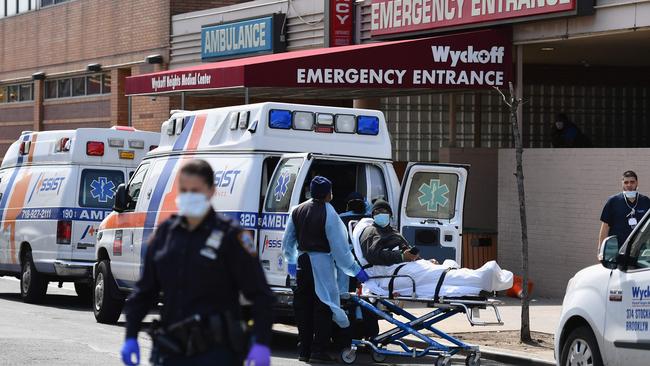
Joyce Moullakis 8.40am: BOQ defers dividend decision
Bank of Queensland has become the first domestic lender to defer making a call on its dividend payment, after the banking regulator urged capital be conserved to support the economy.
Investors waiting for the release of BOQ’s half-year results on Wednesday, first received an announcement of the dividend deferral due to fallout from the coronavirus pandemic.
“While BOQ has considered these downside scenarios in light of the impacts of COVID-19, based on this APRA (Australian Prudential Regulation Authority) guidance, BOQ has determined that it is prudent to defer the decision on payment of an interim dividend until the economic outlook is clearer and stress testing results have been discussed with APRA,” the bank said in a statement to the ASX.
APRA late on Tuesday urged banks to cut their dividends – and consider their suspension – during the current crisis to help support the economy and ensure credit keeps flowing.
Read more: APRA tells banks to slash payouts
8.22am: IAG’s CEO Harmer to retire
IAG says CEO Peter Harmer plans to retire by the end of 2020.
The insurer says a “flexible” nine-month period of transition has been agreed with Mr Harmer to ensure a smooth changeover.
A search process has been launched for a new boss to ensure a “strong field of internal and external candidates”.
IAG chief financial officer Nick Hawkins has been appointed deputy CEO with accountability for the management and performance of IAG’s day-to-day operations during the transition period. He will start in this role immediately.
IAG CEO Australia Mark Milliner continues to lead the Australian business.
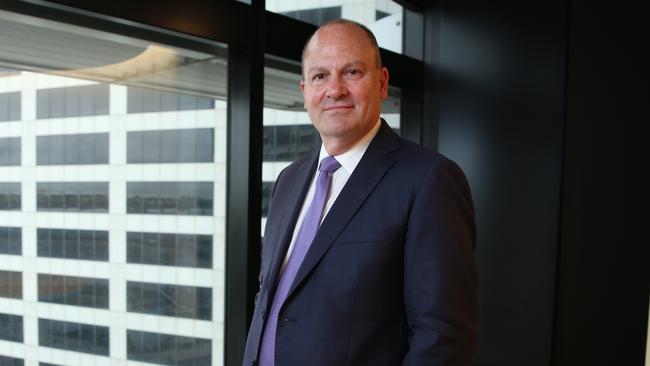
8.15am: NAB to consider payout call
National Australia Bank says it will “take into account” APRA’s guidance on the payment of dividends.
It comes after the Australian Prudential Regulation Authority said banks should “seriously consider” suspending dividends until the fallout from COVID-19 recedes.
APRA also said that if they decided to declare dividends based on robust stress-testing results discussed with APRA, the payments should be at a “materially reduced level”.
“NAB’s board will take APRA’s guidance into account when it considers NAB’s 2020 interim dividend settings as part of the half year results process,” the bank said.
NAB is due to release results on May 7.
7.40am: Treasury mulls Penfolds demerger
Treasury Wine Estates says it will consider a demerger of its Penfolds business and associated assets into a separate company to be listed on the ASX by the end of calendar 2021.
Treasury made the announcement to the ASX in the wake of a strategic review.
It says the move builds on the wine maker’s focus on “premiumisation” and on accelerating the separate focus for the “luxury versus commercial portfolios”.
Penfolds, founded in 1844, is perhaps best known for its Penfolds Grange label.
CEO Michael Clarke said: “Penfolds accounts for approximately 10pc of our volume, but well over half of our earnings, with unique resources and a differentiated execution focus compared to the remainder of our business.”
If the potential demerger was to be implemented, Treasury shareholders would own a share in Penfolds and in “new” TWE proportional to their existing TWE holdings.
The potential demerger remains subject to a detailed evaluation of the costs and benefits to shareholders, along with final board, shareholder and regulatory approvals, Treasury said.
Read more: Plan for Penfolds to go it alone
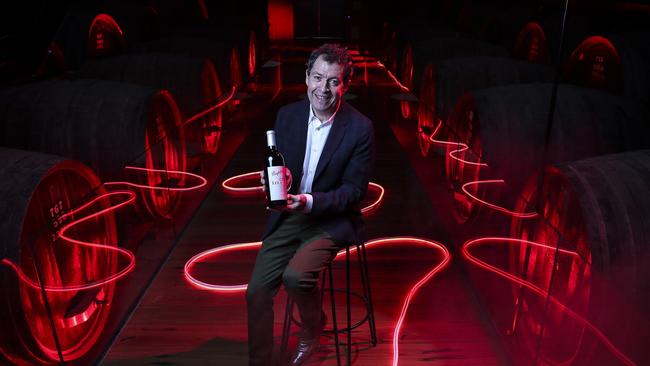
7.20am: ASX set to sink at open
The Australian share market is expected to slide at the open after Wall Street shed its early gains on a steepening oil price decline.
At 7am (AEST) the SPI200 futures contract was down 52 points, or 0.99 per cent, at 5,190.0 points, suggesting local stocks will extend losses the start of trade.
The S&P/ASX200 benchmark index touched a high of 5,423.1, a gain of 2.6 per cent, in the first 10 minutes of trade on Tuesday but ended up finishing down 34.5 points, or 0.65 per cent, to at 5,252.3 points.
The All Ordinaries index shed 22.3 points, or 0.42 per cent, to 5,301.3, after going as high as 5,464.2.
Much like local equities, US stocks built early gains on Tuesday following tentative signs coronavirus outbreaks in some of the biggest hot spots are easing.
However, the major overseas indices slipped as oil prices plunged late in the session.
The Australian dollar was buying US61.68 cents at 7am (AEST), down from US61.84c at the close of markets on Tuesday.
AAP
6.50am: Oil sinks amid deal doubts
Oil prices slumped as doubts grew about a co-ordinated global production cut that would help to keep supplies from far outpacing demand this year.
The reversal erased gains that the commodity had made earlier in the day. While members of OPEC appear to be lining up behind a cut, the US remains a wildcard.
West Texas Intermediate, or WTI, futures dropped 9.4pc to settle at $US23.63 a barrel, leaving the price down 61pc for the year. Brent crude futures fell 3.6pc to $US31.87.
On Tuesday, the Energy Information Administration released new projections for oil production and prices this year. The EIA expects Brent crude to average $US23 in the second quarter, well below today’s prices, and $US33 for the full year.
The EIA sees average US crude production falling to 11.8 million barrels a day this year from 12.3 million last year, and then dropping to 11.1 million in 2021. The agency’s projections don’t take into account the possibility of an OPEC cut to output.
An OPEC production-cut deal will likely be contingent on other countries also cutting production. While Russia may get on board, the US is less likely to make an orchestrated cut. The American Petroleum Institute opposes new restrictions that it says “could do more harm than good for American producers,” and several companies are pushing back on any new rules too.
Dow Jones
6.15am: US stocks give up gains, end lower
US stocks finished slightly lower, erasing earlier gains, buoyed by indications that the spread of the coronavirus pandemic was slowing in some hot spots around the world.
The Dow Jones Industrial Average slipped 26 points, or 0.1pc, after rising more than 930 points earlier in the session. The S&P 500 and the Nasdaq Composite also declined, losing 0.2pc and 0.3pc, respectively.
The late slide on Wall Street was reflected in ASX futures, down 43 points, or a touch under 1pc, at 6.15am.
Small signs of success from global social distancing measures drove the market higher earlier in the day. In New York, Governor Andrew Cuomo said Tuesday that the state has projected that it is reaching a plateau of daily hospitalisation. Globally, countries including Spain and Iran have seen the daily toll of new infections and deaths flatten. Wuhan, the Chinese city where the virus was first detected, prepared to lift its travel ban at midnight Tuesday.
“It’s hard to reject the view that things are improving,” said Paul O’Connor, head of multiasset at Janus Henderson. “Markets have been celebrating this in the last couple of days.”
Still, the trends are preliminary and authorities have warned that the coronavirus infections in the US and UK are likely to worsen in the coming week.
Even more, economic indicators have shown that a deep recession may be looming.
Plenty of investors remained sceptical about the recent rally.
Ken Moraif, founder of Retirement Planners of America, said he doesn’t believe a small drop in daily infections bodes well for the overall economy. He said his company, which had $US4.5 billion in assets under management at the end of 2019, has sold all equity and bond positions, opting instead for cash.
“I’m having difficulty in understanding how a small business that has gone bankrupt is going to go back into business because we have reached the peak of infections,” Mr. Moraif said.
“I just think this is slowly degrading like the Titanic, and the people who are buying right now don’t believe how bad this really is,” he continued.
Markets have swung sharply in recent weeks as investors have tried to make sense of a fast-spreading pandemic that has warranted unprecedented responses by the Federal Reserve and U.S. government.
Meanwhile, oil prices fell after starting the day higher. Brent crude, the global gauge of oil prices, slid 3.2pc to $US32.01 a barrel as demand for oil has fallen during the pandemic.
Beyond the U.S., the pan-continental Stoxx Europe 600 ended the day higher, rising 1.9pc. Japan’s Nikkei 225 and China’s Shanghai Composite both rose more than 2pc.
Dow Jones Newswires
6.10am: Wall Street stocks end lower
Wall Street stocks finished lower as a rally based in part on optimism over apparent progress in combating the coronavirus faded late in the session.
The Dow Jones Industrial Average, which was up almost 1000 points earlier in the session, finished down 0.1 per cent at 22,653.86.
The broadbased S&P 500 shed 0.2 per cent to 2,659.41, while the tech-rich Nasdaq Composite Index lost 0.3 per cent to 7,887.26.
AFP
5.55am: Switzerland loses borrowing cost crown
Switzerland’s bond yields have shot higher than those of Germany for the first time in years, causing the financial haven to lose its long-held position as the economy with the world’s lowest borrowing costs.
Yields on Swiss government bonds are still in negative territory but have risen sharply in recent weeks, as the Swiss National Bank’s response to the coronavirus pandemic has been less aggressive than efforts by the European Central Bank and the U.S. Federal Reserve. Investors are paying up for eurozone government bonds in particular, thanks to bond-buying programs the ECB has introduced that the SNB hasn’t.
Two-year and 10-year Swiss bond yields have risen higher than those on rival German bonds for the first time in more than a decade. A 10-year Swiss government bond yields minus 0.27pc, compared with minus 0.97pc on March 9. That is now 0.10 percentage point higher than comparable German bonds, which sport the lowest yields among major economies. Japanese yields were the world’s lowest for a time in 2018.
Dow Jones
5.40am: Wall Street’s rally fades
A big rally on Wall Street lost steam in afternoon trading, undercut in part by another plunge in the price of oil.
The S&P 500 had been up as much as 3.5pc early in the day, tacking more gains onto its 7pc surge Monday following encouraging signs that the coronavirus pandemic may be close to levelling off in some of the hardest hit areas of the world.
But the gains mostly evaporated in the afternoon after the price of US crude oil slid more than 7pc. Energy stocks in the S&P 500 were clinging onto a 2.9pc gain after earlier being up nearly 8pc.
That weighed on the overall market, and the S&P 500 was up just 0.7pc, as of 2:52pm. Eastern time.
The Dow Jones Industrial Average was up 148 points, or 0.7pc, to 23,828, and the Nasdaq was up 0.1pc.
After closing lower yesterday, Australian stocks are tipped to slip at the open. At 5.40am (AEST) the SPI futures index was down 13 points.
The Australian dollar was stronger, at US61.87c.
Earlier in the day, Wall Street had surged to big gains as markets around the world rallied for a second straight day following encouraging signs that the coronavirus pandemic may be close to levelling off in some of the hardest hit areas of the world.
Even though economists say a punishing recession is inevitable, the stock market is looking ahead to when economies will reopen from their medically induced coma.
Many professional investors say they’re wary of the recent upsurge and expect more volatility ahead. But if Tuesday’s slight gains hold, it would be one of the few times the market has mustered a back-to-back gain since the coronavirus outbreak caused it to start selling off in mid-February.
Oil prices have been even more volatile than the stock market in recent weeks as demand dries up for energy amid a global economy weakened by the coronavirus outbreak. Russia and Saudi Arabia have also been locked in a price war, refusing to cut production even as the world is awash in excess oil.
Benchmark US crude oil fell $US1.98 to $US24.11 per barrel.
AP
5.37am: ‘Pharma Bro’ wants to research virus
Convicted former drug company CEO Martin Shkreli, known as “Pharma Bro,” wants to get out of prison so he can help research a treatment for the coronavirus, his lawyer said.
Defence attorney Ben Brafman said that he will file court papers asking federal authorities to release Shkreli for three months so he can do laboratory work “under strict supervision.” His client – best known before his arrest for drug price-gouging and his snarky online persona – is housed at a low-security prison in Allenwood, Pennsylvania. “I have always said that if focused and left in a lab, Martin could help cure cancer,” Brafman said in a statement. “Maybe he can help the scientific community better understand this terrible virus.”
In a research proposal posted online, Shkreli called the pharmaceutical industry’s response to the pandemic “inadequate” and said researchers at every drug company “should be put to work until COVID-19 is no more.”
Shkreli wrote that his background “as a successful two-time biopharma entrepreneur, having purchased multiple companies, invented multiple new drug candidates” would make him a valuable asset.

AP
5.35am: ECB tries to stimulate lending
The European Central Bank on Tuesday announced an “unprecedented” easing of collateral requirements to stimulate bank lending during the coronavirus crisis.
The package of temporary measures includes the use of loans from small corporate entities as collateral and accepting Greek sovereign debt as guarantees.
“These measures are temporary for the duration of the pandemic crisis,” the ECB’s governing council said.
AFP
5.32am: Saudi to host energy ministers’ meeting
Saudi Arabia will host a virtual meeting Friday of energy ministers from the Group of 20 major economies in a bid to ensure “market stability” amid a coronavirus-led slump in crude prices.
The video call will follow an emergency meeting on Thursday of OPEC and other oil producers to address the virus-sapped demand for crude and a price war between Saudi Arabia and Russia.
“The Saudi G20 presidency will hold an extraordinary G20 energy ministers’ virtual meeting on Friday … to foster global dialogue and co-operation to ensure stable energy markets,” said a statement released Tuesday by the Saudi hosts.
“The G20 energy ministers will also act, alongside invited countries, and regional and international organisations, to alleviate the impact of the COVID-19 pandemic on the energy markets.” Crude oil prices collapsed to 18-year lows last week owing to a price war between Saudi Arabia and Russia, which have ramped up output despite weak demand.
The global markets will closely watch whether OPEC and other major producers led by Russia reach an agreement to reduce oversupply in talks on Thursday.
AFP
5.30am: Markets surge on hopeful virus signs
Global stock markets posted strong gains for a second straight session as investors seized on signs of a slowdown in the spread of the coronavirus, while some governments began making plans to ease restrictions.
“Investors are betting that the coronavirus outbreak may have peaked and are ignoring the economic slump that we are in,” said Fawad Razaqzada, an analyst with Trading Candles.
But Razaqzada also said he “wouldn’t be surprised if the rally were to end abruptly because the economic impact of COVID-19 is going to be severe”.
In the meantime, oil was energised by hopes that key producers will agree to cut output at this week’s emergency OPEC+ video meeting, which will address virus-sapped demand and a price war.
Following on from gains in Asian and European equities, Wall Street also posted solid gains in the late New York morning, when the Dow was up by more than 600 points.
“Equities are still racing higher, as the news from key countries like Spain and Italy remains positive,” said IG analyst Chris Beauchamp. “Stocks continue to rally as investors look for the positives in the current global outlook.”
Tokyo, Hong Kong and Shanghai stocks all finished around two per cent higher. After the close in Japan however, Prime Minister Shinzo Abe declared a month-long state of emergency in the capital and six other parts of the country over a spike in virus cases.
In Europe, key indices were off the day’s best levels, but still posted gains of more than two per cent at the close. London closed up 2.1pc, Frankfurt rose 2.8pc and Paris gained 2.1pc.
AFP
5.25am: ExxonMobil slashes spending
ExxonMobil announced it will slash its budget by 30 per cent for oilfield projects as the petroleum industry reels from sharply lower demand due to the coronavirus.
The move, the latest cutback in spending by an oil giant, comes as US oil prices remain stuck in the mid-$20 per-barrel range, less than half their price a year ago as the sharp economic slowdown due to coronavirus thrashes oil demand.
ExxonMobil said the bulk of the 2020 cut — to $US23 billion from $US33 billion — would come in the Permian Basin, a shale-rich region in Texas and New Mexico that has attracted heavy investment in recent years.
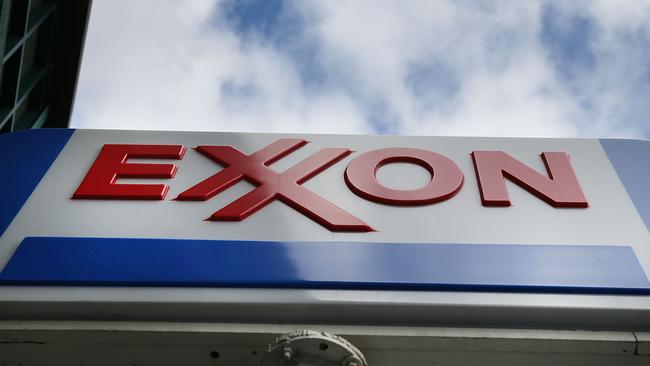
AFP
5.22am: EU split on ‘coronabonds’
EU finance ministers struggled Tuesday to bridge differences on how to relaunch their economies after the coronavirus, with Germany refusing Italy’s call for unprecedented solidarity with hard hit countries.
The European economy has been battered by the epidemic, with countries imposing strict lock downs that have closed businesses and put normal life on hold.
For weeks the EU’s 27 member states have bickered about ways to respond to the havoc caused, with Italy and Spain pleading for a solidarity fund that would be paid for by European partners jointly borrowing money on the markets.
Sometimes called coronabonds, this proposal is firmly rejected by Germany, the Netherlands and other rich countries who see it as an attempt by the allegedly profligate south to unfairly gain cheap interest on their debt thanks to the north’s fiscal discipline.
5.20am: Challenger bank raises $34m
Cuscal-backed challenger bank 86 400 has brought on its first outside investors, raising a total of $34 million in new capital.
The Series A capital raise led by Morgan Stanley raise brings its total capital to $90 million.
The investors included fund managers, an Australian superannuation fund, high net worth individuals and family offices, the neobank said.
It is one of the largest Australian fintech series A rounds to date. “It gives us a vote of confidence in us and what we are doing,” chief executive Robert Bell said.
The neobank has grown to more than 170,000 accounts since launching in September and says it is on track to hit 500,000 accounts in the next 12 months, with a mortgage book of close to $2 billion by the end of 2021.
AAP
5.15am: Appeal for EU rescue plan
The head of the Eurogroup of eurozone finance ministers on Tuesday called for a major rescue plan for Europe, as member states squabbled over what was needed to rebuild the shattered economy.
“Today, I am convening the EU finance ministers for a bold response for the COVID-19 outbreak,” said Mario Centeno, who is also Portugal’s finance minister, ahead of a videoconference with his counterparts.
Speaking in a video statement, Centeno said he will call on the EU’s 27 member states “to make a clear commitment for a co-ordinated and sizeable recovery plan”.
AFP

